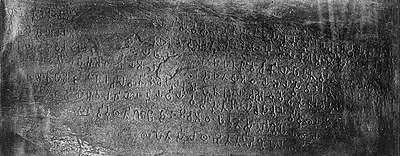Sasaram
| Sasaram | |
|---|---|
| City | |
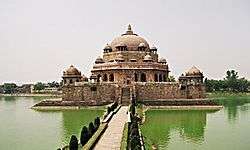 A view of the Tomb of Sher Shah Suri | |
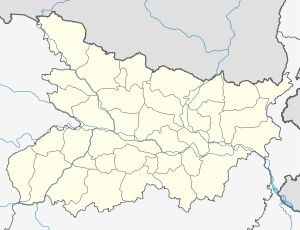 Sasaram Location in Bihar, India  Sasaram Sasaram (India) | |
| Coordinates: 24°57′N 84°02′E / 24.95°N 84.03°ECoordinates: 24°57′N 84°02′E / 24.95°N 84.03°E | |
| Country |
|
| State | Bihar |
| Region | Shahabad |
| Division | Patna Division |
| District | Rohtas |
| Ward | 40 |
| Government | |
| • Type | Municipal Council |
| • Body | Sasaram Municipal Council |
| • Chairman | Kanchan Devi |
| • District Magistrate(DM) | Pankaj Dixit (IAS) |
| • MP | Chhedi Paswan (BJP) |
| • Superintendent of Police(SP) | Satya Veer Singh (IPS) |
| Elevation | 110 m (360 ft) |
| Population (2014)[1] | |
| • Total | 147,425 |
| • Rank | 101th |
| Demonym(s) | Sasaramite |
| Time zone | UTC+5:30 (IST) |
| PIN | 821115 |
| Telephone code | 06184 |
| Vehicle registration | BR-24 |
| Railway Station | Sasaram Junction railway station |
| Website |
sasaram |
Sasaram sometimes also spelled as Sahasram, is an ancient city of India has witnessed the legacy of Sahastrabahu, Shershah Suri, and Jagjivan Ram Babu. In prehistoric period it was called as the gateway of "Vihar" It means an entry gate to visit Nalanda & Gaya area. Mahatma Buddha has passed through this way to get an enlightenment in Gaya. Modern Sasaram city covers the largest sub-metropolitan area of Bihar. It has many highly recognized religious and historical spots to visit which is surrounded by a scenic Kaimur mountain and rivers like Sone and Kav. Sasaram city is situated in the middle of many industries. The main posh places of the sub-metropolitan area are Gauraxni, New Area, Tomb Area and Fazalganj commercial zones. The city has several malls and multiplexes along with best 3-star hotels with premium medical facilities. Sasaram city covers other areas such as Dehri, Jamuhar, Dalmianagar, Son nagar, Nokha, Muradabad, Tilauthu, Amjhor, and Kudra, is the administrative headquarters of Rohtas District Bihar India. It became a district carved out from Shahabad District in 1972. It Is In Rohtas district ; Sasaram city is best known for highest literacy rate and highest forest cover area in Bihar
It is known for the production of cement, fertilizer, stone chips, and for the quarrying industry.
Major languages spoken in this region are Bhojpuri, Hindi, and Urdu; local religions include Hinduism, Islam, Sikhism, Buddhism, and Jainism.
History
During the Vedic age, Sasaram was a part of the ancient Kashi kingdom. Sasaram name is originated from the Sahastraram. During ancient times,king sahastrabahu ruled over the region including today's Sasaram. The Brahmin warrior, Parsuram fought with sahastrabahu in Sasaram. After the war was over, the place was named by the initials of sahastrabahu and the last of Parsuram, thus the name - sahastra + ram, making the name as Sahastraram. Sasaram was originally named Shah Serai (meaning "Place of King") as it is the birthplace of the Afghan king Sher Shah Suri, who ruled over Delhi, much of northern India, what is now Pakistan, and eastern Afghanistan for five years, after defeating the Mughal Emperor Humayun. Many of Sher Shah Suri's governmental practices were adopted by the Mughals and the British Raj including taxation, administration, and the building of a paved road from Kabul to Bengal.
Sher Shah Suri's 122 feet (37 m) red sandstone tomb, built in the Indo-Afghan style stands in the middle of an artificial lake at Sasaram. It borrows heavily from the Lodhi style, and was once covered in blue and yellow glazed tiles indicating an Iranian influence. The massive free standing dome also has an aesthetic aspect of the Buddhist stupa style of the Mauryan period. The tomb of Sher Shah's father Hasan Khan Suri is also at Sasaram, and stands in the middle of a green field at Sherganj, which is known as Sukha Rauza. About a kilometer to the north west of Sher Shah's tomb lies the incomplete and dilapidated tomb of his son and successor, Islam Shah Suri.[2] Sasaram also has a baulia, a pool used by the emperor's consorts for bathing.
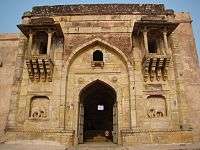
The fort of Sher Shah Suri at Rohtasgarh is in Sasaram. This fort has a history dating back to the 7th century AD. It was built by Raja Harishchandra in the name of his son Rohitashwa, son of illustrious king Harishchandra, known for his truthfulness. It houses the Churasan temple, Ganesh temple, diwan-e khas, diwan-e-aam, and various other structures dating back to different centuries. The fort also served as the headquarters of Raja Man Singh during his reign as the governor of Bihar and Bengal under the regime of Akbar. The Rohtaas fort in Bihar should not be confused with another fort of the same name, near Jhelum, Punjab, in what is now Pakistan. The Rohtaas fort in Sasaram was also built by Sher Shah Suri, during the period when Humayun was exiled from Hindustan.
There is a temple of Goddess Tarachandi, two miles to the south, and an inscription of Pratap Dhawal on the rock close to the temple of Chandi Devi. Hindus in large number assemble to worship the goddess. Dhuwan Kund, located about 36 km. Gupta Dham is also a tourist destination and religious place, situated in the Chenari Block of this district. This place is a famous centre of Shiva-Aradhana. Hindus in large numbers assemble here to worship the Lord Shiva. The two waterfalls have enough capacity to generate 50-100 MW of electricity, if utilized properly.
There are several monuments near Sasaram, the headquarter of Rohtas district, including Akbarpur, Deomarkandey, Rohtas Garh, Shergarh, TaraChandi, Dhuwan Kund, Gupta Dham, Bhaluni Dham, Historical Gurudwara and Tombs of Chandan Shaheed, Hasan Khan Sur, Sher Shah, Salim Sah and Alawal Khan.
Rohtas, south of Sasaram, is known to have been the residence of one Satyawadi Raja Harischandra, named for his son, Rohitashwa.
Samadhi of Shree Shree 1008 Shree Swami Parmeshwara Nand Ji Maharaj, also known as Adwait Ashram, Dakshin Kutia, situated in Parampuri (Raipur Chaur) 12 kilometres (7.5 mi) from Sasaram. Adwait Ashram has about 24 branches over the country in many states. The headquarters is in Sasaram, and is also known as Navlakha Ashram.
Babu Nishan Singh who was the general of Babu Kunwar Singh's army fighting against the British during the 1857 GADAR freedom struggle, came from Sasaram. Jainath Bhawan is a grand mansion built by a magistrate named Babu Harihar Prasad Verma, and his wife Uma Devi Verma, in 1945. The mansion is named for Babu Jainath Prasad, who was a Zamindar and the first lawyer to practice in English. A secondary school founded by Uma Devi Verma, named Harihar Uma Madhyamik Vidyalaya, still runs at the Meyari Bazar, although it is now administered by the government.
Minor Rock Edict of Ashoka
Sasaram is also famous for an inscription by Ashoka (one of the thirteen Minor Rock Edicts), situated in a small cave of Kaimur hill, near Chandan Shaheed.
The edict is located near the top of the terminal spur of the Kimur Range near Sasaram.[3] There is the Minor rock edict #1 only [4] Ashoka famously mentions pre-existing stone pillars in the Edict: "...And where there are stone pillars here in my dominion, there also cause it to be engraved.". 24°56′29″N 84°02′18″E / 24.94138°N 84.03833°E
The Sasaram Edict (Minor Rock Edict No.1 only).
- Devanampriya [speaks] thus.
- .................. years since I am a lay-worshipper (upasaka).
- But (I had) not been very zealous.
- A year and somewhat more (has passed) since ............
- And men in Jambudvipa, being during that time unmingled with the gods, have (now) been made (by me) mingled with the gods.
- [For] this is the fruit [of zeal].
- ...........cannot be reached by (persons of) high rank alone, (but) even a lowly (person) is able to attain even the great heaven if he is zealous.
- Now, for the following purpose (has) this proclamation (been issued), (that) both the lowly and the exalted may be zealous, and (that) even (my) borderers may know (it), and (that this) zeal may be of long duration,
- And this matter will (be made by me to) progress, and will (be made to) progress even considerably; it will (be made to) progress to one and a half, to at least one and a half.
- And this proclamation (was issued by me) on tour.
- Two hundred and fifty-six nights (had then been) spent on tour, — (in figures) 256.
- And cause ye this matter to be engraved on rocks.
- And where there are stone pillars here (in my dominions), there also cause (it) to be engraved.
— Sasaram Edict (Translated in Inscriptions of Asoka. New Edition by E. Hultzsch)[5]
 The Edict is located on top of the terminal spur of the Kimur range.
The Edict is located on top of the terminal spur of the Kimur range.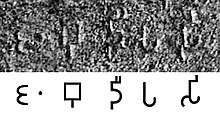 The name Jambudīpasi for "India" (Brahmi script) in the Sahasram Minor Rock Edict of Ashoka, circa 250 BCE.[6][7]
The name Jambudīpasi for "India" (Brahmi script) in the Sahasram Minor Rock Edict of Ashoka, circa 250 BCE.[6][7] Transcription of the Edict.
Transcription of the Edict.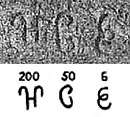 The number "256" towards the end of the Edict.
The number "256" towards the end of the Edict.
Tomb of Sher Shah Suri
Coordinates: 24°56′N 84°01′E / 24.933°N 84.017°E
This site is included in UNESCO World Heritage Centre – Tentative list.[8]
Tomb of Sher Shah, built in the middle of the town, is one of the noblest specimens of Pathan architecture in India, is an imposing structure of stone, standing in the middle of a fine tank, and was built towards the middle of sixteenth century. Its height from the floor to the apex of the dome is 101 feet and its total height above the water is over 150 feet. The octagon forming the tomb has an interior diameter of 75 feet and an exterior diameter of 104 feet. The tomb is the second highest in India which attracts tourists. The tomb of Shershah Suri at Sasaram is an imposing structure of stone standing in the middle of a fine tank and rising from a large stone terrace. This terrace rests obliquely on a platform with a flight of steps leading to the water's edge. The upper terrace is enclosed by a battlemented parapet wall with octagonal domed chambers at four corners, two small projecting pillared balconies on each of its four sides and pierced with a doorway in the east forms the only approach to the tomb. In the middle of the upper terrace stands the building of the mausoleum on a low octagonal plinth. The building consists of a very large octagonal chamber surrounded by a wide verandah on al the four sides. Internally, the verandah is covered by a series of 24 small domes, each supported on four arches but as the roof is a pillared cupola adorned by panels of white glazed tiles now much discoloured. The tomb chamber has three lofty arches on each of the eight sides. They rise 22 feet higher than the verandah roof and support the magnificent and lofty dome which is one of the largest domes in India. Surrounding the main dome are eight pillared cupolas on the corners of the octagon of the chamber walls. The interior of the tomb is sufficiently well ventilated and lighted through large windows on the top portion of the walls fitted with stone jalis in varying patterns. The jambs and spandrils of the arch of the mihrab on the western wall were once profusely adorned with verses from the Quran and inscriptions, with glazed tiles of various colours arranged in geometrical patterns and with floral carvings in stone enclosed in enamel borders. Much of this decoration has vanished already. Traces of similar decoration in enamel or glazed tile works are also to be scen on the interior of the dome, the walls and the cupolas on the outside. In a small arched recess above the mihrab on the outside wall is an inscription in two lines recording the completion of the tomb by his son and successor Salim or Islam Shah, some 3 months after the death of Sher Shah who died in A.H. 952 (A.D.1545). It is second largest dome of India.
The tomb of Hasan Khan Sur, father of Sher Shah is also located in the town. This tomb is also known as Sukha Roza.
Geography
Sasaram is located at 24°57′N 84°02′E / 24.95°N 84.03°E.[9] It has an average elevation of 200 metres (660 ft).
Climate
As Sasaram is surrounded by hills from two sides, its climate is seasonable. The climate is characterized by relatively high temperatures and evenly distributed precipitation throughout the year. The Köppen Climate Classification sub-type for this climate is "Cfa" (Humid Subtropical Climate).[10]
| Climate data for Sasaram, India | |||||||||||||
|---|---|---|---|---|---|---|---|---|---|---|---|---|---|
| Month | Jan | Feb | Mar | Apr | May | Jun | Jul | Aug | Sep | Oct | Nov | Dec | Year |
| Average high °C (°F) | 23.8 (74.8) |
26.7 (80.1) |
32.7 (90.9) |
38.0 (100.4) |
40.9 (105.6) |
38.5 (101.3) |
33.2 (91.8) |
32.0 (89.6) |
32.4 (90.3) |
31.8 (89.2) |
28.1 (82.6) |
24.1 (75.4) |
31.9 (89.3) |
| Daily mean °C (°F) | 16.2 (61.2) |
18.9 (66) |
24.2 (75.6) |
29.6 (85.3) |
33.2 (91.8) |
32.8 (91) |
29.2 (84.6) |
28.4 (83.1) |
28.2 (82.8) |
25.9 (78.6) |
20.7 (69.3) |
16.5 (61.7) |
25.3 (77.6) |
| Average low °C (°F) | 8.8 (47.8) |
11.1 (52) |
15.8 (60.4) |
21.2 (70.2) |
25.5 (77.9) |
27.0 (80.6) |
25.3 (77.5) |
24.8 (76.6) |
23.9 (75) |
20.0 (68) |
13.3 (55.9) |
8.9 (48) |
18.8 (65.8) |
| Average rainfall mm (inches) | 19.2 (0.756) |
21.2 (0.835) |
14.3 (0.563) |
7.6 (0.299) |
12.2 (0.48) |
120.9 (4.76) |
297.5 (11.713) |
326.2 (12.843) |
181.5 (7.146) |
50.9 (2.004) |
10.2 (0.402) |
3.6 (0.142) |
1,065.3 (41.943) |
| Average rainy days | 1.5 | 1.8 | 1.5 | 1.0 | 1.4 | 5.9 | 14.3 | 14.3 | 8.9 | 2.8 | 0.5 | 0.8 | 54.7 |
| Source: Weatherbase[11] | |||||||||||||
Demographics
As of 2011 India census, Sasaram had a population of 247,408 but in urban agglomeration Sasaram metropolitan area has about 8 lacs people. Males constitute 52% of the population and females 48%. Sasaram has an average literacy rate of 80.26%, higher than the national average of 74%; male literacy is 85%, and female literacy is 75%. In Sasaram, 13% of the population is under 6 years of age.[12]
Sasaram is the 16th most populous city in bihar.
Governance
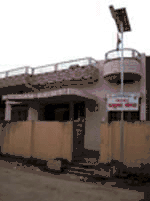
SAHAJ Vasudha Kendra, the first "Common Service Centre", or "eKiosk", in Rohtas District was inaugurated in Jamuhar village on 15 August 2008. The centre is currently planning to start a block information Centre, e-district plan, and Sawan Sasaram.
Lok Sabha constituency
Sasaram (Lok Sabha constituency) is one of the 40 Lok Sabha (parliamentary) constituencies in Bihar state in eastern India.
Vidhan Sabha constituency
Sasaram (Vidhan Sabha constituency) is one of 243 legislative assembly of Bihar. It is comes under Sasaram lok sabha constituency. [13]
Economy
The closure of the industries of the Dalmia Group at Dalmianagar resulted in widespread unemployment. Sasaram's economy is mainly driven by agriculture and related industries like rice polishing. The canal irrigation system is also very prominent in this area. Because of the fertile land around the town it is a local trading center for food grains, agricultural products, and agricultural equipment. The region is known as Dhan Ka Katora, meaning "a bowl of food grains". The rice grown near Sasaram is sold in the markets of Kolkata and New Delhi. The only significant industry is rock quarrying.
Transportation
Sasaram is well connected both by road and railways. The NH 19 (old number: NH 2; Grand Trunk Road) passes through the city. The main mode of local transportation are buses operated by both private operators and the state government. The private buses are more frequent and connected to most of the local bazaars. NH 19 connects Delhi in the north-west via Varanasi, Mirzapur, Allahabad, Kanpur and Kolkata in East via Gaya, Dhanbad. Various state highways also connect Sasaram with Patna, the capital of Bihar (via Bikramganj, Piro, Ara), Buxar (on the bank of the holy river Ganga via Kargahar, Kochas, Rajpur).
Sasaram has a big railway junction. This Station belongs to A class category with 8 (2 more are in construction) platforms. This station is located at the center of the city on the Grand Trunk Road. Another railway station of Sasaram are Shivsagar, Nokha, Karwandiya, Pahleja and Dehri on Sone.
The railway route through Sasaram is the Grand Chord line of Indian Railways, connecting Kolkata and New Delhi, and has three (2 more are under construction) railway tracks running in parallel. Another railway line connects Sasaram Junction to Patna Junction via Ara. More two railway lines are proposed to be constructed here.
Sasaram station is 101 kilometers away from Mughalsarai station (Less Than 1.5 Hours) and about 120 Kilometers, or two hours journey from Varanasi, and 101 kilometers from Gaya station. Gaya station is 20 kilometers away Bodh Gaya, the most sacred place in Buddhism. Trains run from Sasaram to Kolkata, New Delhi, and Bombay.
The trains which stop in Sasaram include Kalka Mail, Purushottam Express, Mahabodhi Express, Ranchi Garib Rath, Kolkata Mail, Jodhpur Howrah Express, Chambal Express, Shipra Express, Chennai Egmore Express, Nandan Kanan Express, Neelanchal Express and Poorva Express.
Also a direct weekly AC train had been started from Sasaram to Anand Vihar Terminal in July 2011 (22409/22410 - Sasaram - Anand Vihar Garib Rath Express). However, now this AC train runs between Gaya and Anand Vihar Terminal, still stopping at Sasaram Junction .
Sasaram has also an small and old airport called Suara Airport.
Education
Bihar has among the poorest rates of literacy in India. However, there has been an increase in literacy under the governance of Nitish Kumar, Chief Minister of Bihar, and Sasaram is the sixth most literate city in Bihar, with Rohtas the most literate district in Bihar.[14]
Due to the lack of sources of employment, students of higher education often choose to migrate to other cities in search of employment, however trend is changed the city has emerged as the premium hub of the coaching centers for UPSC, Medical, Engineering and Competitive exams preparation.There are four government colleges, it has a university branch, but most students prefer to go to more developed cities for quality education, such as Bangalore, New Delhi, Pune, Patna, Varanasi and Puducherry, for higher education. A new engineering college has been set up in the region.
when we talk about eduation in sasaram,we should not forget about Bihar Pride. It is said that the two twenty years old graduating student, Abhinandan Kumar Singh(IIT Delhi) and Abhinav Singh Yadav(JNU,New Delhi) has founded it to create a social reform environment.
This is Place is also known for preparation of competitive exams at Sasaram Railway junction. Actually, According to earlier natives of this city, there was not proper electrification of city around 2007 - 2008 which hampered the studies of students seeking for competitive exams. Still Indian Railways had 24 hours power supply at Sasaram junction. This led a small group of students to study there at night under electric lights. Currently, Now there is continuous 18 hours+ power supply in city but students only come here to study with other students. With the support of Indian Railways; There are many street lights built to provide light to students at end of junction.
Higher education institutions
- Gopal Narayan Singh University [15]
- Babu Jagjivan Ram Central University (under construction)
Medical colleges include:
- Narayan Medical College and Hospital[16]
- Mahatma Phule Medical College and Hospital, Sasaram
- Sher Shah Suri Medical Training Institute, Sasaram
Other colleges include:
- College of Engineering and Management Rohtas
- Shershah College of Engineering
- Jagannath Mishra Law College
- Shri Shankar College, Sasaram [17]
- Shanti Prasad Jain College, Sasaram, a branch of Veer Kunwar Singh University, Arrah [18], [19], [20]
- Hari Narain Singh Institute of Teachers Education (HNSITE)[21]
- Sri Shankar Rajkiya Inter College[22]
- D.A.V. Public school, Admapur, Sasaram
- Government Polytechnic, Dehri
- Bihar Pride
Notable people
- Sher Shah Suri: Emperor of India, conquered Mughal Empire defeating 2nd Mughal emperor Humayun
- Babu Jagjivan Ram: Deputy Prime Minister of India (1977-1979)
- Mira Kumar: Speaker of the Lok Sabha (2009-2014)
- Chhedi Paswan: Bharatiya Janata Party leader, Member of India's Parliament
- Kavi Kumar Azad: TV and Movie Actor, famous for his role in popular TV serial Taarak Mehta Ka Ooltah Chashmah as Dr. Hansraj Hathi
References
- ↑ "Census of India Search details". censusindia.gov.in. Archived from the original on 18 May 2015. Retrieved 10 May 2015.
- ↑ Sanatani, Rohit Priyadarshi. "The Tomb of Salim Shah Suri (Islam Shah): The glory that never was". The Speaking Arch. Archived from the original on 2 April 2015. Retrieved 27 March 2015.
- ↑ BLO
- ↑ India: An Archaeological History: Palaeolithic Beginnings to Early Histor ic ... by Dilip K. Chakrabarty p.395
- ↑ Inscriptions of Asoka. New Edition by E. Hultzsch (in Sanskrit). 1925. p. 171.
- ↑ Inscriptions of Asoka. New Edition by E. Hultzsch (in Sanskrit). 1925. pp. 169–171.
- ↑ Lahiri, Nayanjot (2015). Ashoka in Ancient India. Harvard University Press. p. 37. ISBN 9780674057777.
- ↑ "Sites along the Uttarapath, Badshahi Sadak, Sadak-e-Azam, Grand Trunk Road". UNESCO World Heritage Centre. Archived from the original on 17 January 2018. Retrieved 16 January 2018.
- ↑ Falling Rain Genomics, Inc - Sasaram Archived 2008-03-11 at the Wayback Machine.
- ↑ Climate Summary for Sasaram, India Archived 2018-01-17 at the Wayback Machine.
- ↑ "Sasaram, India — Monthly Weather Averages Summary". weatherbase. Archived from the original on 17 January 2018. Retrieved 16 January 2018.
- ↑ Sasaram City Census 2011 data Archived 2016-04-05 at the Wayback Machine.
- ↑ "Archived copy". Archived from the original on 2017-12-31. Retrieved 2017-12-31.
- ↑ SAWAN SASARAM
- ↑ http://www.gnsu.org/
- ↑ "Welcome to Narayan Medical College & Hospital!". Archived from the original on 2011-07-26.
- ↑ http://sscollegesasaram.org Archived 2018-03-25 at the Wayback Machine.
- ↑ https://www.spjainsasaram.co.in Archived 2018-05-17 at the Wayback Machine.
- ↑ "Archived copy". Archived from the original on 2018-05-18. Retrieved 2018-05-17.
- ↑ "Archived copy". Archived from the original on 2018-06-05. Retrieved 2018-05-23.
- ↑ http://www.hnsite.org Archived 2018-03-25 at the Wayback Machine.
- ↑ Veer Kunwar Singh University (VKSU) Archived 2018-06-05 at the Wayback Machine.
External links
| Wikimedia Commons has media related to Sasaram. |

